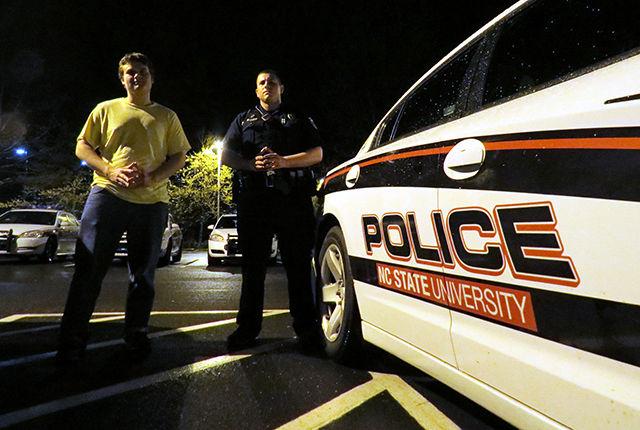For many people, the thought of campus police brings to mind a Paul Blart-like security guard riding around in a golf cart on the lookout for misbehaving students.
According to David Green, a public safety officer with the NC State Campus Police Department, this is a comical and erroneous Hollywood stereotype.
“If that’s a golf cart right there, then I’m really confused,” Green said, nodding toward a running squad car with a V-8 engine.
It was in this car that I would participate in a ride along to see what a day in the life of a campus police officer was like.
According to Green, there’s no telling what’s in store for an officer on any given day.
“There really is no typical day,” he said.
The first call Green responded to on the ride was a drug call. By the time we arrived at the building where the call was made, there was an officer and two bystanders at the scene where the smell of marijuana was fairly noticeable.
Green explained to me the protocol of situations involving drugs and how they are handled.
For searches, Fourth Amendment rights are a priority to uphold, which protect citizens from unreasonable search and seizures and requires that any judicially sanctioned warrant be supported by probable cause.
We didn’t get to see how the drug situation played out, however, as Green was alerted of a medical emergency on the north side of campus.
The situation called for what is known as “code,” which alerts that an officer is responding to a felony or medical emergency. Simply put, “code” is when the flashing blue lights come on.
The emergency turned out to be an allergy-related incident. The person reported experiencing shortness of breath and other allergy-like symptoms, though no official cause was established.
Paramedics came to check the person and see if any further medical action was required. After determining everything was okay, Green and I followed the person home by the person’s request.
The next stop was the Dan Allen parking deck. Though the decks are monitored by video surveillance, cars are still broken into and patrolling the area is still necessary.
According to Green, signs of a break-in can range anywhere from the blatantly obvious broken car door window to potentially less subtle indications like a car door that’s been left open.
Patrolling the decks can also entail encountering people drinking alcohol where they shouldn’t be, or people who go out there to smoke marijuana in their cars.
Green emphasized the importance of the department’s drug policy, noting that abusing drugs and alcohol can too easily be a detriment to a student’s education, which is of primary importance to the department.
“It’s not my job to tell students they can’t hang out and have a good time,” he said. “It’s my job to make sure they are safe and aren’t doing anything that might be harmful to their education.”
After responding to each call, Green typed up his reports into the squad car computer. When there are no pressing needs at a given moment, Green said he likes to use the time to brush up on legal policies and codes.
The remainder of the ride involved a quick walk-around check of Holladay Hall, where the chancellor’s office is, and a call to check out a situation at D.H. Hill Library. Following those two excursions, Green decided called it night.
The Campus Police Department offers the Ride Along program as a way to “increase understanding between Officers in the Campus Police Department and the University community,” and to serve as means to educate the community, according to the department’s webpage.
“We’re a department that strives to be education-based,” Green said. “We encourage students and members of the community to participate in the many educational programs we offer.”








